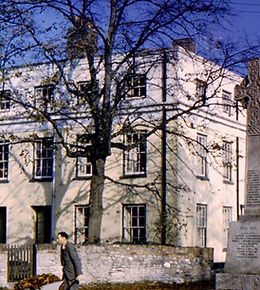top of page

COACHING TRADE
Coaching Days in Benson by Janet Bottomley
Private letter deliveries between London and Oxford were in operation as early as 1601, and later the postal service became a royal monopoly. Then certain innkeepers were granted the privilege of supplying the necessary horses and their houses became known as posting houses. The London Road turnpike in 1736 brought many more travellers to Benson. Sweeping down from Nettlebed, down Beggarbush Hill, post and stage coaches, private carriages, horse-riders, wagons and stock of all kinds, made their way to Oxford.
The main London Road once entered the village of Benson from Mill Lane and passed into the High Street near the Red Lion which was on the corner. This is the oldest surviving building known to have existed in Benson since the days of Ralph Quelche, who died in 1629, and rebuilt the inn twice. Charles I held court at the Red Lion Inn in Benson during the Civil War. Later, the coaching route was diverted from Mill Lane to (Old) London Road, and entered the village between the Crown Inn and The Plough. (See map below drawn by E. Ditmas)

By 1750, the journey from Oxford to London could be accomplished in a day! For example, around that time the Rev. James Newton who was sightseeing in Windsor earlier in the day, later drank tea at Benson and was at home in Nuneham by 8pm.
Gradually from 1810 to 1830, the newly sealed road surfaces helped the coaches to reach speeds of 12 miles an hour. This improved the comfort, and journey times became faster. However sometimes up to 15 passengers were crowded on a single coach some inside and some outside in the cold!
In 1840 the main public houses in Benson were The Castle, The White Hart, The Crown, The Three Horseshoes, The Plough, The Red Lion, The Sun (Eight Bells), The Farmers Man, The Duchess, The Lamb and Flag, The Ship, and The Swan (at Crowmarsh). At this time, it is recorded that fifty stage coaches a day rattled through Benson’s well-macadamised streets.
The prosperity of The Crown Inn and The Plough which stood opposite it was partly due to them being the last staging post before Oxford. In Benson a stabling of 200 horses kept the coaches supplied with fresh horses when needed. The employment of many shoe smiths, harness makers, saddlers and wheelwrights maintained the coaches in good condition on their journeys to Oxford and London. In 1847, the publican of the Three Horseshoes was also a Blacksmith. There were stables behind all the village inns, and some of these outbuildings survived until the twentieth century. The inns were used by travellers for refreshments and overnight accommodation.



Above: The Castle, the White Hart and the Crown have all welcomed travellers over the centuries, but only the Crown is still a public house.
The Crown Inn, on the Old London Road, bears the date 1709. It was held by the Costar or Costard family for several generations. It was described as a Posting House, as were the White Hart and the Castle, which means it was an establishment where horses could be hired for a given stage of a coaching route. The Crown was also a point where the mail was picked up and delivered by coach. Benson Post Office was situated next door to the Crown Inn until the twenty first century.
From 1840 the coaching trade in Benson was badly affected when the Great Western Railway opened up tracks just south of Wallingford, and Benson returned to making a living as a mainly agricultural village.

Above: Stagecoach outside Benson Post Office about 1908. It ran in the summer months between Oxford and London as a tourist attraction. Click here for more details about Vanderbilt's coach company.
The photograph shows the tourist coach outside the shop run by Edgar John Munday as both a Post Office and saddlery. Edgar was the son of Henry Munday, born in Ewelme, who was a harness maker in Brook Street from 1861 to 1881. Edgar was born about 1865 and he ran the Post Office until 1937, when Mr Shotton took over.
Benson Post Office used to be the centre for receiving, despatching and delivering Royal Mail for North Stoke, Ipsden, Turners Court, Roke and Berrick, in addition to the village and Preston Crowmarsh. There were two deliveries and despatches each day except Sundays via Wallingford from about 1860 to 1929 and then up to 1977 via Oxford.
COACH TIMETABLES Click here to browse coach timetables from Jackson's Oxford Journal
COSTAR COACH COMPANY Father and son, William and Richard Costar ran coach services to all parts of the country, from Oxford. They also owned houses, property and stables in Benson.
Click here to read their story.
COACHMAKING TRADES IN BENSON Coachmaking, coachpainting, saddlery and harnessmaking employed many Benson people at one time. Click here to read more.
bottom of page